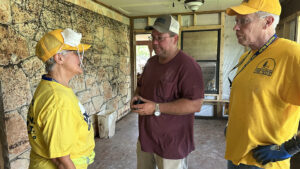

Do They Have the Votes?
Congressional Supporters of Destructive Embryonic Stem Cell Research are Hopeful

![]() Promoters of embryonic stem cell research are predicting they could have the votes in the next Congress to overcome a presidential veto and provide federal funds for the destructive experimentation.
Promoters of embryonic stem cell research are predicting they could have the votes in the next Congress to overcome a presidential veto and provide federal funds for the destructive experimentation.
A more realistic outlook, however, appears to make such a result unlikely.
Rep. Nancy Pelosi, who will be the Speaker of the House of Representatives in the next Congress, has said approval of federal funding of embryonic stem cell research (ESCR), which requires the destruction of human embryos, will be a priority during the first one hundred hours of the 110th Congress in January, according to The Salt Lake Tribune. Sen. Edward Kennedy, D.-Massachusetts, chairman of the committee that oversees stem cell research, also said the issue is a major focus in the Senate, The Tribune reported November 24.
The Democrats' takeover of both houses of Congress has prompted ESCR supporters such as Sen. Orrin Hatch, R.-Utah, and Rep. Diana DeGette, D.-Colorado, to think optimistically.
"I think we have the votes in the Senate to override a veto, and we may have them in the House," Hatch said, according to The Tribune. "I think we can get there. According to some, we're only a couple of votes short, and I think I know where those votes are."
DeGette, who will be the lead sponsor of an embryonic stem cell research bill, spoke to the House's forty-one new Democrats recently and said, "To describe them as wildly enthusiastic about this bill would be an understatement. I think the election really sent a message to Washington that the voters want embryonic stem cell research passed."
The American Medical Association, however, said the voters did not send enough pro-embryonic stem cell research representatives to Washington to change the policy, LifeNews.com reported. The election "did not produce veto-proof congressional majorities" for ESCR funding, according to the AMA.
The House will be about thirty votes short of overriding a presidential veto, predicted James Fossett of the Alden March Bioethics Institute in Albany, New York, according to LifeNews.
Following November's election, the Democrats have a 232-202 edge in the House, with one seat still not decided at press time. In the Senate, the Democrats hold a 51-49 organizational margin.
In July, the House fell fifty-one votes short of overriding President Bush's veto of a bill that would have provided funds for research on embryos donated from fertility clinics.
The White House signaled Bush would not change his policy of opposing embryonic stem cell research funding. Experiments using non-embryonic stem cells have provided treatments for at least seventy-two ailments, according to Do No Harm, a coalition promoting ethics in research. Those include spinal cord injuries, lupus, rheumatoid arthritis, sickle cell anemia, and multiple sclerosis.
White House spokesman Blair Jones told The Tribune that Bush already supports stem cell research, including research on bone marrow, fat, and umbilical cord blood.
"Those are facts that cannot be denied," Jones said. "After careful and thoughtful deliberation with government and outside experts, there was only one moral line that the president said that he would not cross — and that is that federal taxpayer dollars should not be used in the destruction of embryos."
Bush's veto of the Stem Cell Research Enhancement Act is the only one during his six years in the White House. He instituted a policy in August 2001 permitting funds for research only on embryonic stem cell lines already in existence when his policy was announced.
The Senate approved ESCR funds in July in a 63-37 vote, four votes short of a veto-proof majority.
Stem cells are the body's master cells that can develop into tissues and other cells, providing hope for the treatment of numerous afflictions. While federal government funding of experiments on embryonic stem cells is barred, such research itself is legal and ongoing in this country.
Many scientists contend embryonic stem cells have more therapeutic potential than their non-embryonic counterparts, but embryonic research has yet to reach clinical trials in human beings and has been plagued by the development of tumors in lab animals.
No Rights for Embryos
 Ireland's constitution does not protect the right to life of embryos in storage, a judge has ruled.
Ireland's constitution does not protect the right to life of embryos in storage, a judge has ruled.
Judge Brian McGovern wrote that "the right to life of the unborn" in the Irish Constitution does not include embryos created through in vitro fertilization, The New Zealand Herald reported November 15. McGovern said the three embryos in question "are not 'unborn.'"
"There has been no evidence…to establish that it was ever in the mind of the people voting on the [Eighth] Amendment to the Constitution that 'unborn' meant anything other than a fetus or child within the womb," McGovern said in his eighty-eight-page opinion, according to The Herald.
Ireland, which is predominantly Catholic, has banned abortion except when the mother's life is threatened.
Diarmuid Martin, the Roman Catholic archbishop of Dublin, criticized the ruling, according to the newspaper, saying in a written statement, "Human life must be respected and protected absolutely from the moment of conception. From the first moment of his or her existence, a human being must be recognized as having the rights of a person."
McGovern's ruling prevented a mother from having the embryos implanted over the objections of her estranged husband and the fertility clinic, The Herald reported. The mother, who was unnamed, gave birth to a girl in 2002 after IVF treatment. Her three other embryos were frozen and placed in storage.
Ban Enacted
 Nicaraguan President Enrique Bolanos signed into law November 17 a complete ban on abortions, even those to save the life of the mother.
Nicaraguan President Enrique Bolanos signed into law November 17 a complete ban on abortions, even those to save the life of the mother.
Nicaragua becomes the thirty-fifth country in the world with a comprehensive abortion ban, according to LifeNews.
The measure passed the legislature in late October.
Previously, Nicaraguan law permitted an exception for abortion if three doctors confirmed the procedure is needed to protect a woman's health. Advocates for the new law contended that exception allowed a woman seeking an abortion to convince physicians to cite her health as the reason for the procedure, LifeNews reported.
A "Dangerous" Look
 Some British doctors and scientists have called new ultrasound technology that shows twelve-week-old unborn babies appearing to "walk" in the womb "dangerous."
Some British doctors and scientists have called new ultrasound technology that shows twelve-week-old unborn babies appearing to "walk" in the womb "dangerous."
Those scans are hazardous — "to the Culture of Death," a popular Southern Baptist commentator on cultural issues said in response.
The images from a four-dimensional ultrasound method have prompted a re-evaluation of abortion law in England, The Times of London reported October 3. The 4-D technique, which was developed by Stuart Campbell of the Create Health Clinic in London, has produced photos that show unborn children kicking and bouncing in the womb at twelve weeks of gestation, yawning and sucking their thumbs at sixteen weeks, and opening their eyes at eighteen weeks, according to The Times.
The scans have prompted pro-life advocates to call for a tightening of British law, which permits abortions for most reasons until twenty-four weeks of gestation. Former Conservative Party leader Michael Howard has said he would support a twenty-week limit, and Prime Minister Tony Blair may support a reconsideration of the law, The Times reported.
Some medical specialists have reacted negatively to the impact of the images.
"I had two reactions when I saw those photographs," said Donald Peebles of the Department of Obstetrics and Gynecology at University College London, according to The Times. "One was that this was a fantastic piece of technology that showed very clearly what we knew already about the [fetus] in a way that was comprehensible to the public.
"But there was also a temptation to associate these movements — sucking a thumb, gasping as if talking — with adult movements, to think it is sucking its thumb because it is happy. It's that feeling which I think is extraordinarily dangerous."
Huseyin Mehmet, a reader in developmental neurobiology at Imperial College London, told The Times, "Personification of the [fetus] at that age is dangerous. I was worried when I saw those images. To suggest that an early [fetus] in utero has those kind of human qualities of being able to suck its thumb and move, that it meets the biological definition of being really viable outside the uterus, is very difficult indeed."
R. Albert Mohler, president of Southern Baptist Theological Seminary, agreed the images are dangerous but said their threat is to the abortion rights movement.
The scans "are, of course, extraordinarily dangerous — dangerous to the Culture of Death," Mohler wrote on his October 5 weblog.
"[Peebles] fears that we will associate the fetal actions with 'adult movements,'" Mohler said.
"Actually, that is largely beside the point. No one is mistaking the fetus as an adult — but those movements are recognizably and undeniably human, and that is the point.
"That baby has been human from the moment of conception — the point of fertilization," he wrote. "As such, the baby deserves full protection and respect. Our eyes have now seen this baby at twelve weeks, and we see the revelation of who that baby really is — one of us. This is one key reason why the abortion debate is on shifting ground — and why the abortion rights movement is playing defense."
Forced Prison Abortion
 A new report says there are eyewitness accounts to female inmates in North Korea being forced to have abortions.
A new report says there are eyewitness accounts to female inmates in North Korea being forced to have abortions.
The Korean Bar Association reported 58 percent of defectors it interviewed said they saw or heard about coerced abortions on pregnant women in North Korean prisons, according to The Korea Times. The report was based on two years of research, including interviews with about one hundred North Korean defectors.
The report was not surprising. Forced abortions on inmates, as well as infanticide outside prisons, have been reported previously from the world's most closed country.
In March, a North Korean doctor said the communist country is remarkably free of physically impaired people, because they are quickly eliminated. At a forum in Seoul, South Korea, Ri Kwang-choi said babies with physical disabilities are put to death in hospitals or homes and soon buried, according to the Reuters news service. The regime of dictator Kim Jong Il promotes killing such infants, Kwang-choi said.















